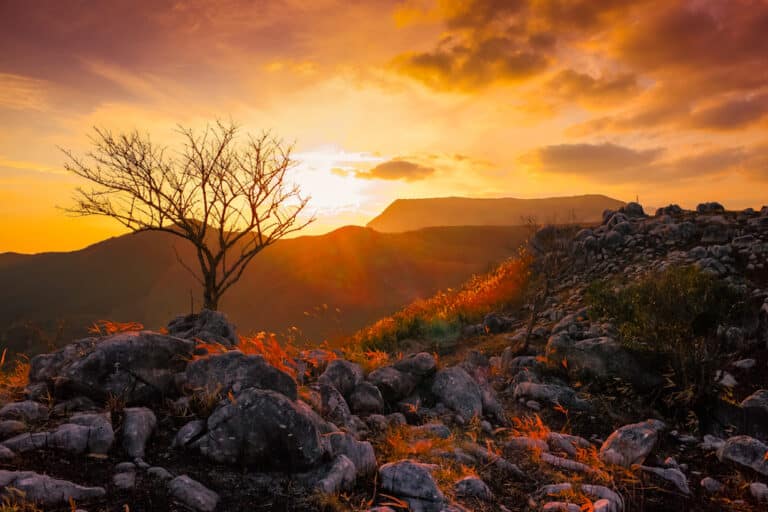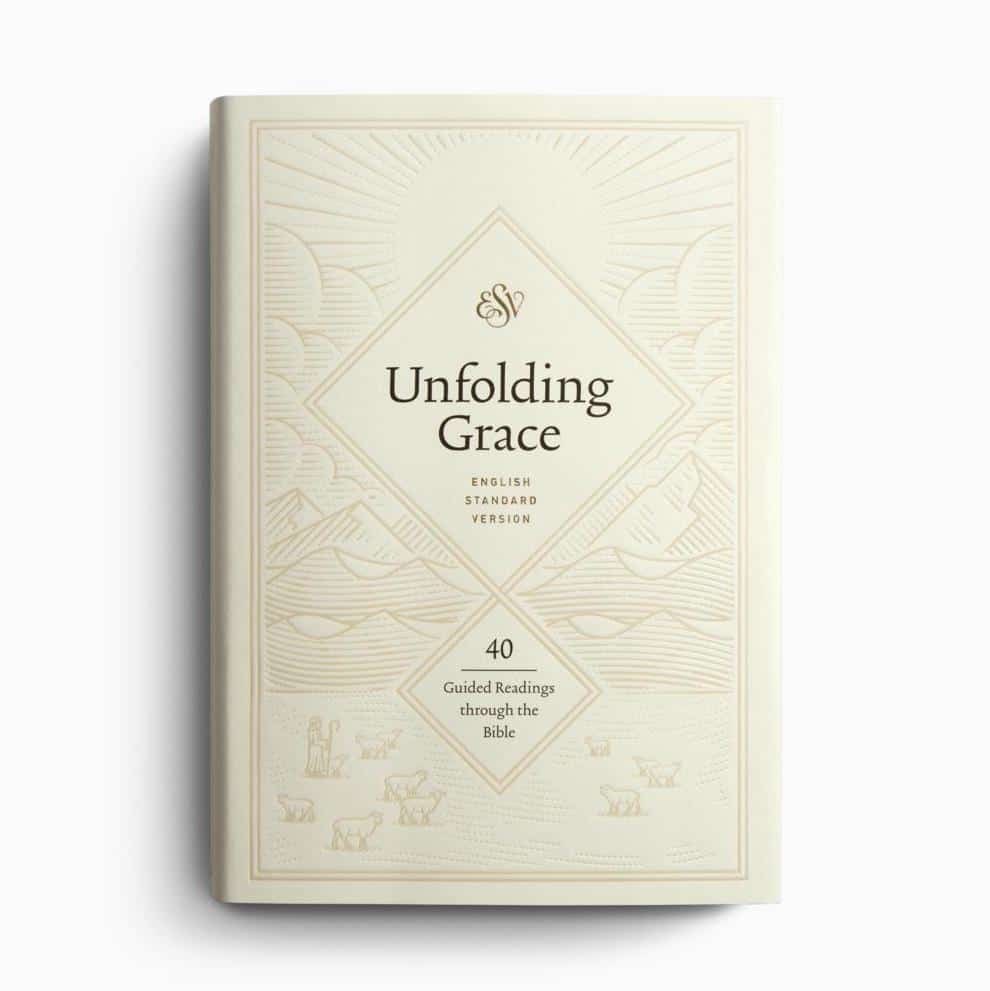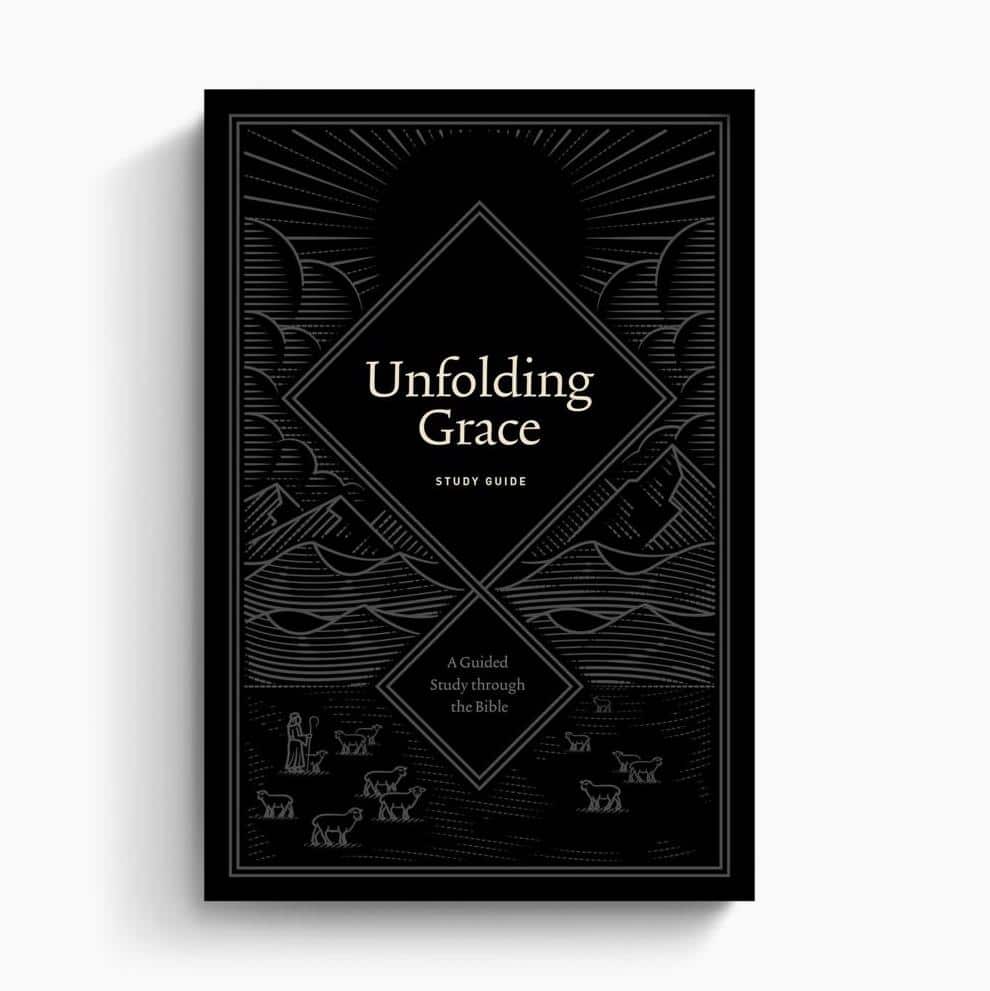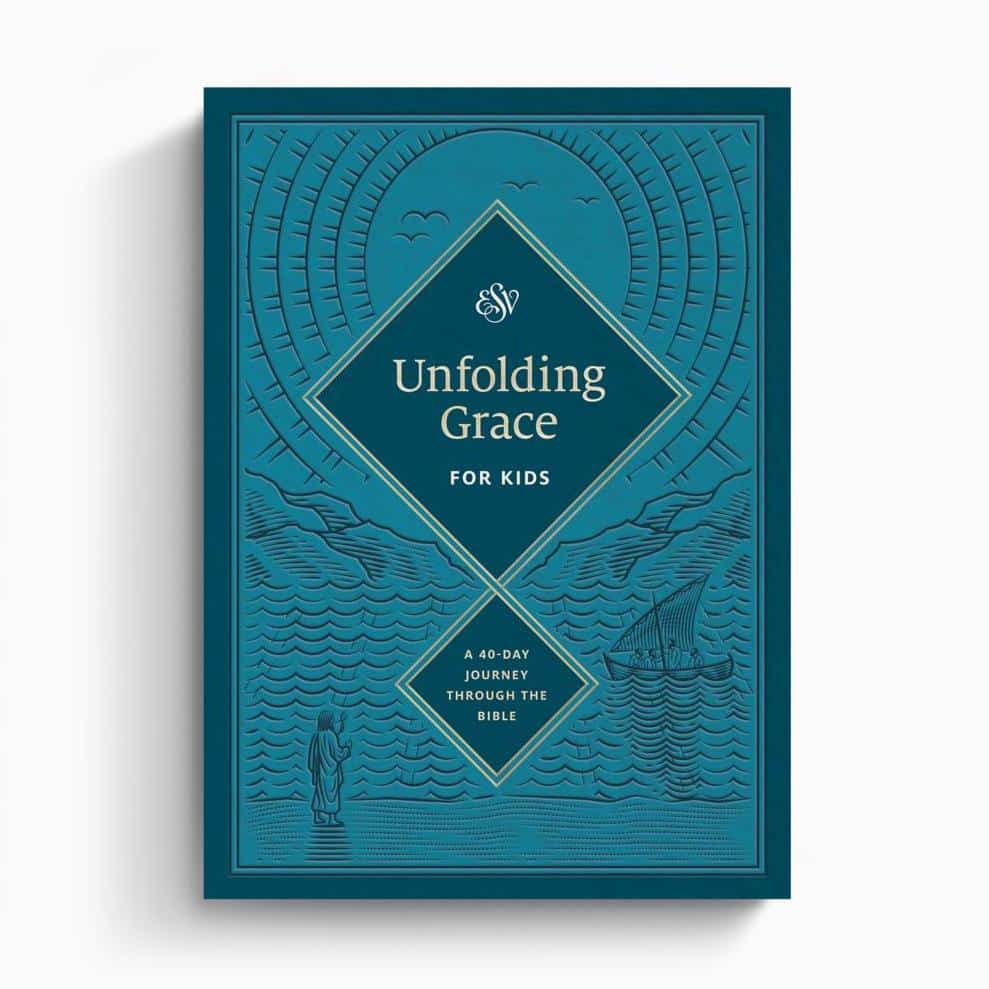LESSON ELEVEN
The Idolatry of Israel and the Heart of God
God liberates Israel in three movements. He delivers them from slavery, brings them into a covenant relationship, and gives instructions to build a tabernacle (a portable tent) in order for his presence to dwell with them. This shows us that God delivers his people in order to dwell with them. Redemption is for relationship.
But Israel’s persistent rebellion creates a problem. How can this holy God dwell with such a rebellious people? God’s nature provides the answer: he reveals to Moses his “glory”—his radiance, his beauty, his weighty personal presence—by announcing that he is a “God merciful and gracious, slow to anger, and abounding in steadfast love and faithfulness.”
But there is a tension here. He is also a God of justice, for he “will by no means clear the guilty.” How will this tension be resolved? How will he show mercy to sinners without compromising his justice? We will need to keep this question in mind throughout the rest of the Old Testament story. The tension will ultimately find resolution in only one place: at the cross, where God shows mercy to sinners while upholding his justice by punishing our sin in Christ.
SCRIPTURE READING
Exodus 32-34
Reading Time: 13 Minutes
When the people saw that Moses delayed to come down from the mountain, the people gathered themselves together to Aaron and said to him, “Up, make us gods who shall go before us. As for this Moses, the man who brought us up out of the land of Egypt, we do not know what has become of him.” So Aaron said to them, “Take off the rings of gold that are in the ears of your wives, your sons, and your daughters, and bring them to me.” So all the people took off the rings of gold that were in their ears and brought them to Aaron. And he received the gold from their hand and fashioned it with a graving tool and made a golden calf. And they said, “These are your gods, O Israel, who brought you up out of the land of Egypt!” When Aaron saw this, he built an altar before it. And Aaron made a proclamation and said, “Tomorrow shall be a feast to the Lord.” And they rose up early the next day and offered burnt offerings and brought peace offerings. And the people sat down to eat and drink and rose up to play.
And the Lord said to Moses, “Go down, for your people, whom you brought up out of the land of Egypt, have corrupted themselves. They have turned aside quickly out of the way that I commanded them. They have made for themselves a golden calf and have worshiped it and sacrificed to it and said, ‘These are your gods, O Israel, who brought you up out of the land of Egypt!’ ” And the Lord said to Moses, “I have seen this people, and behold, it is a stiff-necked people. Now therefore let me alone, that my wrath may burn hot against them and I may consume them, in order that I may make a great nation of you.”
But Moses implored the Lord his God and said, “O Lord, why does your wrath burn hot against your people, whom you have brought out of the land of Egypt with great power and with a mighty hand? Why should the Egyptians say, ‘With evil intent did he bring them out, to kill them in the mountains and to consume them from the face of the earth’? Turn from your burning anger and relent from this disaster against your people. Remember Abraham, Isaac, and Israel, your servants, to whom you swore by your own self, and said to them, ‘I will multiply your offspring as the stars of heaven, and all this land that I have promised I will give to your offspring, and they shall inherit it forever.’ ” And the Lord relented from the disaster that he had spoken of bringing on his people.
Then Moses turned and went down from the mountain with the two tablets of the testimony in his hand, tablets that were written on both sides; on the front and on the back they were written. The tablets were the work of God, and the writing was the writing of God, engraved on the tablets. When Joshua heard the noise of the people as they shouted, he said to Moses, “There is a noise of war in the camp.” But he said, “It is not the sound of shouting for victory, or the sound of the cry of defeat, but the sound of singing that I hear.” And as soon as he came near the camp and saw the calf and the dancing, Moses’ anger burned hot, and he threw the tablets out of his hands and broke them at the foot of the mountain. He took the calf that they had made and burned it with fire and ground it to powder and scattered it on the water and made the people of Israel drink it.
And Moses said to Aaron, “What did this people do to you that you have brought such a great sin upon them?” And Aaron said, “Let not the anger of my lord burn hot. You know the people, that they are set on evil. For they said to me, ‘Make us gods who shall go before us. As for this Moses, the man who brought us up out of the land of Egypt, we do not know what has become of him.’ So I said to them, ‘Let any who have gold take it off.’ So they gave it to me, and I threw it into the fire, and out came this calf.”
And when Moses saw that the people had broken loose (for Aaron had let them break loose, to the derision of their enemies), then Moses stood in the gate of the camp and said, “Who is on the Lord’s side? Come to me.” And all the sons of Levi gathered around him. And he said to them, “Thus says the Lord God of Israel, ‘Put your sword on your side each of you, and go to and fro from gate to gate throughout the camp, and each of you kill his brother and his companion and his neighbor.’ ” And the sons of Levi did according to the word of Moses. And that day about three thousand men of the people fell. And Moses said, “Today you have been ordained for the service of the Lord, each one at the cost of his son and of his brother, so that he might bestow a blessing upon you this day.”
The next day Moses said to the people, “You have sinned a great sin. And now I will go up to the Lord; perhaps I can make atonement for your sin.” So Moses returned to the Lord and said, “Alas, this people has sinned a great sin. They have made for themselves gods of gold. But now, if you will forgive their sin—but if not, please blot me out of your book that you have written.” But the Lord said to Moses, “Whoever has sinned against me, I will blot out of my book. But now go, lead the people to the place about which I have spoken to you; behold, my angel shall go before you. Nevertheless, in the day when I visit, I will visit their sin upon them.”
Then the Lord sent a plague on the people, because they made the calf, the one that Aaron made.
The Lord said to Moses, “Depart; go up from here, you and the people whom you have brought up out of the land of Egypt, to the land of which I swore to Abraham, Isaac, and Jacob, saying, ‘To your offspring I will give it.’ I will send an angel before you, and I will drive out the Canaanites, the Amorites, the Hittites, the Perizzites, the Hivites, and the Jebusites. Go up to a land flowing with milk and honey; but I will not go up among you, lest I consume you on the way, for you are a stiff-necked people.”
When the people heard this disastrous word, they mourned, and no one put on his ornaments. For the Lord had said to Moses, “Say to the people of Israel, ‘You are a stiff-necked people; if for a single moment I should go up among you, I would consume you. So now take off your ornaments, that I may know what to do with you.’ ” Therefore the people of Israel stripped themselves of their ornaments, from Mount Horeb onward.
Now Moses used to take the tent and pitch it outside the camp, far off from the camp, and he called it the tent of meeting. And everyone who sought the Lord would go out to the tent of meeting, which was outside the camp. Whenever Moses went out to the tent, all the people would rise up, and each would stand at his tent door, and watch Moses until he had gone into the tent. When Moses entered the tent, the pillar of cloud would descend and stand at the entrance of the tent, and the Lord would speak with Moses. And when all the people saw the pillar of cloud standing at the entrance of the tent, all the people would rise up and worship, each at his tent door. Thus the Lord used to speak to Moses face to face, as a man speaks to his friend. When Moses turned again into the camp, his assistant Joshua the son of Nun, a young man, would not depart from the tent.
Moses said to the Lord, “See, you say to me, ‘Bring up this people,’ but you have not let me know whom you will send with me. Yet you have said, ‘I know you by name, and you have also found favor in my sight.’ Now therefore, if I have found favor in your sight, please show me now your ways, that I may know you in order to find favor in your sight. Consider too that this nation is your people.” And he said, “My presence will go with you, and I will give you rest.” And he said to him, “If your presence will not go with me, do not bring us up from here. For how shall it be known that I have found favor in your sight, I and your people? Is it not in your going with us, so that we are distinct, I and your people, from every other people on the face of the earth?”
And the Lord said to Moses, “This very thing that you have spoken I will do, for you have found favor in my sight, and I know you by name.” Moses said, “Please show me your glory.” And he said, “I will make all my goodness pass before you and will proclaim before you my name ‘The Lord.’ And I will be gracious to whom I will be gracious, and will show mercy on whom I will show mercy. But,” he said, “you cannot see my face, for man shall not see me and live.” And the Lord said, “Behold, there is a place by me where you shall stand on the rock, and while my glory passes by I will put you in a cleft of the rock, and I will cover you with my hand until I have passed by. Then I will take away my hand, and you shall see my back, but my face shall not be seen.”
The Lord said to Moses, “Cut for yourself two tablets of stone like the first, and I will write on the tablets the words that were on the first tablets, which you broke. Be ready by the morning, and come up in the morning to Mount Sinai, and present yourself there to me on the top of the mountain. No one shall come up with you, and let no one be seen throughout all the mountain. Let no flocks or herds graze opposite that mountain.” So Moses cut two tablets of stone like the first. And he rose early in the morning and went up on Mount Sinai, as the Lord had commanded him, and took in his hand two tablets of stone. The Lord descended in the cloud and stood with him there, and proclaimed the name of the Lord. The Lord passed before him and proclaimed, “The Lord, the Lord, a God merciful and gracious, slow to anger, and abounding in steadfast love and faithfulness, keeping steadfast love for thousands, forgiving iniquity and transgression and sin, but who will by no means clear the guilty, visiting the iniquity of the fathers on the children and the children’s children, to the third and the fourth generation.” And Moses quickly bowed his head toward the earth and worshiped. And he said, “If now I have found favor in your sight, O Lord, please let the Lord go in the midst of us, for it is a stiff-necked people, and pardon our iniquity and our sin, and take us for your inheritance.”
And he said, “Behold, I am making a covenant. Before all your people I will do marvels, such as have not been created in all the earth or in any nation. And all the people among whom you are shall see the work of the Lord, for it is an awesome thing that I will do with you.
“Observe what I command you this day. Behold, I will drive out before you the Amorites, the Canaanites, the Hittites, the Perizzites, the Hivites, and the Jebusites. Take care, lest you make a covenant with the inhabitants of the land to which you go, lest it become a snare in your midst. You shall tear down their altars and break their pillars and cut down their Asherim (for you shall worship no other god, for the Lord, whose name is Jealous, is a jealous God), lest you make a covenant with the inhabitants of the land, and when they whore after their gods and sacrifice to their gods and you are invited, you eat of his sacrifice, and you take of their daughters for your sons, and their daughters whore after their gods and make your sons whore after their gods.
“You shall not make for yourself any gods of cast metal.
“You shall keep the Feast of Unleavened Bread. Seven days you shall eat unleavened bread, as I commanded you, at the time appointed in the month Abib, for in the month Abib you came out from Egypt. All that open the womb are mine, all your male livestock, the firstborn of cow and sheep. The firstborn of a donkey you shall redeem with a lamb, or if you will not redeem it you shall break its neck. All the firstborn of your sons you shall redeem. And none shall appear before me empty-handed.
“Six days you shall work, but on the seventh day you shall rest. In plowing time and in harvest you shall rest. You shall observe the Feast of Weeks, the firstfruits of wheat harvest, and the Feast of Ingathering at the year’s end. Three times in the year shall all your males appear before the Lord God, the God of Israel. For I will cast out nations before you and enlarge your borders; no one shall covet your land, when you go up to appear before the Lord your God three times in the year.
“You shall not offer the blood of my sacrifice with anything leavened, or let the sacrifice of the Feast of the Passover remain until the morning. The best of the firstfruits of your ground you shall bring to the house of the Lord your God. You shall not boil a young goat in its mother’s milk.”
And the Lord said to Moses, “Write these words, for in accordance with these words I have made a covenant with you and with Israel.” So he was there with the Lord forty days and forty nights. He neither ate bread nor drank water. And he wrote on the tablets the words of the covenant, the Ten Commandments.
When Moses came down from Mount Sinai, with the two tablets of the testimony in his hand as he came down from the mountain, Moses did not know that the skin of his face shone because he had been talking with God. Aaron and all the people of Israel saw Moses, and behold, the skin of his face shone, and they were afraid to come near him. But Moses called to them, and Aaron and all the leaders of the congregation returned to him, and Moses talked with them. Afterward all the people of Israel came near, and he commanded them all that the Lord had spoken with him in Mount Sinai. And when Moses had finished speaking with them, he put a veil over his face.
Whenever Moses went in before the Lord to speak with him, he would remove the veil, until he came out. And when he came out and told the people of Israel what he was commanded, the people of Israel would see the face of Moses, that the skin of Moses’ face was shining. And Moses would put the veil over his face again, until he went in to speak with him.
EXODUS 32-34
Study Guide Questions
- What does God reveal to Moses about his character, and how does this give great hope to even the worst of sinners?
- What does Moses’ plea for the Lord to go with his people teach us about what is most valuable in life?
- How does the crucifixion of Jesus ultimately resolve the apparent tension in these chapters between God’s mercy to sinners and the upholding of his justice?
EXODUS 33:12–34:10
Family Discussion Questions
- This story highlights several words that describe God’s character. What are they?
- What does it mean when God says he will be gracious to whom he will be gracious?
- Why does Moses want God to go with Israel so much?
- Why do you think Moses bowed down before God at the end of this story?
- This reading highlighted God’s steadfast love and mercy. How do we see these revealed to us in Jesus?
PART TWO REVIEW
God’s People Redeemed
God multiplies the Israelites while they are in Egypt. Yet, while the people of Israel grow in number, they also cry out because of their slavery to the Egyptians. God chooses to deliver them by raising up Moses as their leader. After a series of judgments on Egypt, God leads his people out from Egypt through the Red Sea. He then brings them to the foot of Mount Sinai in order to enter into a covenant relationship with them. Israel is to become a new humanity, a kingdom of priests restored to God and reflecting his character in the world. God also causes his presence to dwell with his people in the tabernacle. He brings them out of slavery in order to bring them near to him; he delivers them in order to dwell with them.
From Sinai, God will lead his people to their new home, the land of Canaan. However, Israel continually distrusts and disobeys the Lord. Because of this, God causes them to wander in the wilderness for forty years until this first generation passes away. The next generation will be another fresh start, and God leads them into the land through Joshua, their new Moses-like leader.
LESSON ELEVEN
The Idolatry of Israel and the Heart of God
God freed Israel in three movements. He delivered the people from slavery, brought them into a relationship with himself, and gave them instructions to build a tabernacle (a tent) for his presence to be with them. This shows us that God delivers his people in order to dwell with them.
But Israel kept rejecting God. This created a problem: How could this good and holy God dwell with such a rebellious people? God told Moses the answer by revealing his “glory,” the beauty of what he is really like. God announced that he is a “God merciful and gracious, slow to anger, and abounding in steadfast love and faithfulness.” God also will not “clear the guilty,” which means he is right to punish sinners. One day Jesus would come to be punished in the place of sinners so that they could receive this mercy.
SCRIPTURE READING
Exodus 33:12-34:10
Reading Time: 3 Minutes
Moses said to the Lord, “See, you say to me, ‘Bring up this people,’ but you have not let me know whom you will send with me. Yet you have said, ‘I know you by name, and you have also found favor in my sight.’ Now therefore, if I have found favor in your sight, please show me now your ways, that I may know you in order to find favor in your sight. Consider too that this nation is your people.” And he said, “My presence will go with you, and I will give you rest.” And he said to him, “If your presence will not go with me, do not bring us up from here. For how shall it be known that I have found favor in your sight, I and your people? Is it not in your going with us, so that we are distinct, I and your people, from every other people on the face of the earth?”
And the Lord said to Moses, “This very thing that you have spoken I will do, for you have found favor in my sight, and I know you by name.” Moses said, “Please show me your glory.” And he said, “I will make all my goodness pass before you and will proclaim before you my name ‘The Lord.’ And I will be gracious to whom I will be gracious, and will show mercy on whom I will show mercy. But,” he said, “you cannot see my face, for man shall not see me and live.” And the Lord said, “Behold, there is a place by me where you shall stand on the rock, and while my glory passes by I will put you in a cleft of the rock, and I will cover you with my hand until I have passed by. Then I will take away my hand, and you shall see my back, but my face shall not be seen.”
The Lord said to Moses, “Cut for yourself two tablets of stone like the first, and I will write on the tablets the words that were on the first tablets, which you broke. Be ready by the morning, and come up in the morning to Mount Sinai, and present yourself there to me on the top of the mountain. No one shall come up with you, and let no one be seen throughout all the mountain. Let no flocks or herds graze opposite that mountain.” So Moses cut two tablets of stone like the first. And he rose early in the morning and went up on Mount Sinai, as the Lord had commanded him, and took in his hand two tablets of stone. The Lord descended in the cloud and stood with him there, and proclaimed the name of the Lord. The Lord passed before him and proclaimed, “The Lord, the Lord, a God merciful and gracious, slow to anger, and abounding in steadfast love and faithfulness, keeping steadfast love for thousands, forgiving iniquity and transgression and sin, but who will by no means clear the guilty, visiting the iniquity of the fathers on the children and the children’s children, to the third and the fourth generation.” And Moses quickly bowed his head toward the earth and worshiped. And he said, “If now I have found favor in your sight, O Lord, please let the Lord go in the midst of us, for it is a stiff-necked people, and pardon our iniquity and our sin, and take us for your inheritance.”
And he said, “Behold, I am making a covenant. Before all your people I will do marvels, such as have not been created in all the earth or in any nation. And all the people among whom you are shall see the work of the Lord, for it is an awesome thing that I will do with you.”
SERMON SERIES
Finding Our Purpose in God’s Plan
These six messages belong to the Unfolding Grace: Finding Our Purpose in God’s Plan sermon series that author and pastor Drew Hunter preached at his home church. Through these six messages, he tells us the story of the Bible—a story that reveals the grace of God.
BUY THE BOOK
Book Series
The content you enjoy in this Unfolding Grace Reading Plan comes from the Unfolding Grace book series by Pastor Drew Hunter, published by Crossway Publishers. We encourage you to purchase a physical copy of Unfolding Grace to use individually, with your family, or as a small group.








